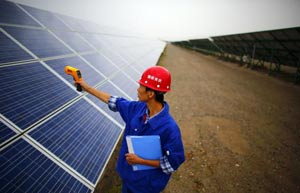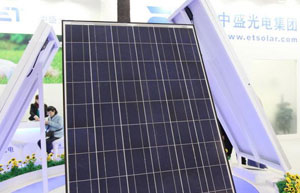US ruling ignites fresh solar row
By Xie Yu in Shanghai (China Daily) Updated: 2014-06-05 06:51"The statement about how to define the origin of solar panels is quite blurred in this ruling. In fact, it contradicts the rule the US had used in the last round of investigations," said Chen Huiqing, director of the legal department at the China Chamber of Commerce for Import and Export of Machinery and Electronic products.
The Ministry of Commerce said the US has ignored facts and legal grounds, and applied conflicting rules to restrict Chinese products. It is an abuse of trade agreements, and is obviously angled at trade protection, which will definitely have a negative impact on the trade disputes between the two countries, said the statement published by the ministry on Wednesday.
"The US cannot solve the problems of its solar companies simply by adopting trade remedy measures. China wants the US to cautiously handle the investigation and terminate it as soon as possible. China will closely watch the case, and reserve the right to protect its own legitimate rights and interests," said the statement.
The Chinese government had decided to impose tariffs in January on US and South Korean polysilicon - the base ingredient for making conventional photovoltaic solar cells.
Chen said the CCCME is actively organizing enterprises to defend themselves. However, once the US decides to add new tariffs and the duty rates are set high, Chinese companies will be forced to leave the US market, she said.
"Currently, Chinese companies account for over 50 percent of the US solar market, a much higher proportion than in 2012. However, if the final rulings turn negative and Chinese companies are forced to pay higher duties, then they will have no choice but to leave the US market," she said.
"Many Chinese solar companies are passing through a rough period. The US decision will definitely create big problems for Chinese companies," said Shawn Qu, CEO of the Nasdaq-listed Canadian Solar based in East China's Jiangsu province.
The flip side of the ruling is that it will also escalate the prices of solar products in the US markets. Large-scale solar plants will diminish, and the market will shrink to half of its current size, Qu said.
The anti-subsidy duties would be imposed after the Commerce Department and the US International Trade Commission make affirmative final rulings. Meanwhile, a preliminary decision on the anti-dumping section is due by July 25.
"The installed cost of PV solar products has dropped by about 75 percent in the last five years, driven largely by the falling price of solar cells as a result of major increases worldwide in polysilicon manufacturing capacity and in Chinese cell and module manufacturing capacity. If this trade dispute is not settled soon, both sides will lose out," said Tony Clifford, CEO of the US-based Standard Solar.
|
 |
 |
- China 'incredibly innovative' in many areas: Apple CEO
- City official: Guangzhou further committed to opening-up
- Jack Ma: Globalization backed by technology will cut inequality
- HNA confirms interest in ASEAN's infrastructure investment
- Comments on Xi's letter to 2017 Fortune Global Forum
- China to create more opportunities for the world: Xi
- US tax cuts impact on China two-sided: economists
- Chinese enterprises job fair to be held in Sri Lanka

















